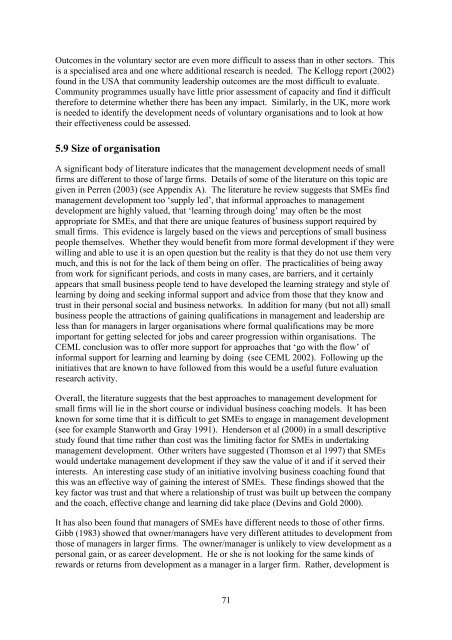The Development of Management and Leadership Capability and its ...
The Development of Management and Leadership Capability and its ...
The Development of Management and Leadership Capability and its ...
Create successful ePaper yourself
Turn your PDF publications into a flip-book with our unique Google optimized e-Paper software.
Outcomes in the voluntary sector are even more difficult to assess than in other sectors. This<br />
is a specialised area <strong>and</strong> one where additional research is needed. <strong>The</strong> Kellogg report (2002)<br />
found in the USA that community leadership outcomes are the most difficult to evaluate.<br />
Community programmes usually have little prior assessment <strong>of</strong> capacity <strong>and</strong> find it difficult<br />
therefore to determine whether there has been any impact. Similarly, in the UK, more work<br />
is needed to identify the development needs <strong>of</strong> voluntary organisations <strong>and</strong> to look at how<br />
their effectiveness could be assessed.<br />
5.9 Size <strong>of</strong> organisation<br />
A significant body <strong>of</strong> literature indicates that the management development needs <strong>of</strong> small<br />
firms are different to those <strong>of</strong> large firms. Details <strong>of</strong> some <strong>of</strong> the literature on this topic are<br />
given in Perren (2003) (see Appendix A). <strong>The</strong> literature he review suggests that SMEs find<br />
management development too ‘supply led’, that informal approaches to management<br />
development are highly valued, that ‘learning through doing’ may <strong>of</strong>ten be the most<br />
appropriate for SMEs, <strong>and</strong> that there are unique features <strong>of</strong> business support required by<br />
small firms. This evidence is largely based on the views <strong>and</strong> perceptions <strong>of</strong> small business<br />
people themselves. Whether they would benefit from more formal development if they were<br />
willing <strong>and</strong> able to use it is an open question but the reality is that they do not use them very<br />
much, <strong>and</strong> this is not for the lack <strong>of</strong> them being on <strong>of</strong>fer. <strong>The</strong> practicalities <strong>of</strong> being away<br />
from work for significant periods, <strong>and</strong> costs in many cases, are barriers, <strong>and</strong> it certainly<br />
appears that small business people tend to have developed the learning strategy <strong>and</strong> style <strong>of</strong><br />
learning by doing <strong>and</strong> seeking informal support <strong>and</strong> advice from those that they know <strong>and</strong><br />
trust in their personal social <strong>and</strong> business networks. In addition for many (but not all) small<br />
business people the attractions <strong>of</strong> gaining qualifications in management <strong>and</strong> leadership are<br />
less than for managers in larger organisations where formal qualifications may be more<br />
important for getting selected for jobs <strong>and</strong> career progression within organisations. <strong>The</strong><br />
CEML conclusion was to <strong>of</strong>fer more support for approaches that ‘go with the flow’ <strong>of</strong><br />
informal support for learning <strong>and</strong> learning by doing (see CEML 2002). Following up the<br />
initiatives that are known to have followed from this would be a useful future evaluation<br />
research activity.<br />
Overall, the literature suggests that the best approaches to management development for<br />
small firms will lie in the short course or individual business coaching models. It has been<br />
known for some time that it is difficult to get SMEs to engage in management development<br />
(see for example Stanworth <strong>and</strong> Gray 1991). Henderson et al (2000) in a small descriptive<br />
study found that time rather than cost was the limiting factor for SMEs in undertaking<br />
management development. Other writers have suggested (Thomson et al 1997) that SMEs<br />
would undertake management development if they saw the value <strong>of</strong> it <strong>and</strong> if it served their<br />
interests. An interesting case study <strong>of</strong> an initiative involving business coaching found that<br />
this was an effective way <strong>of</strong> gaining the interest <strong>of</strong> SMEs. <strong>The</strong>se findings showed that the<br />
key factor was trust <strong>and</strong> that where a relationship <strong>of</strong> trust was built up between the company<br />
<strong>and</strong> the coach, effective change <strong>and</strong> learning did take place (Devins <strong>and</strong> Gold 2000).<br />
It has also been found that managers <strong>of</strong> SMEs have different needs to those <strong>of</strong> other firms.<br />
Gibb (1983) showed that owner/managers have very different attitudes to development from<br />
those <strong>of</strong> managers in larger firms. <strong>The</strong> owner/manager is unlikely to view development as a<br />
personal gain, or as career development. He or she is not looking for the same kinds <strong>of</strong><br />
rewards or returns from development as a manager in a larger firm. Rather, development is<br />
71
















